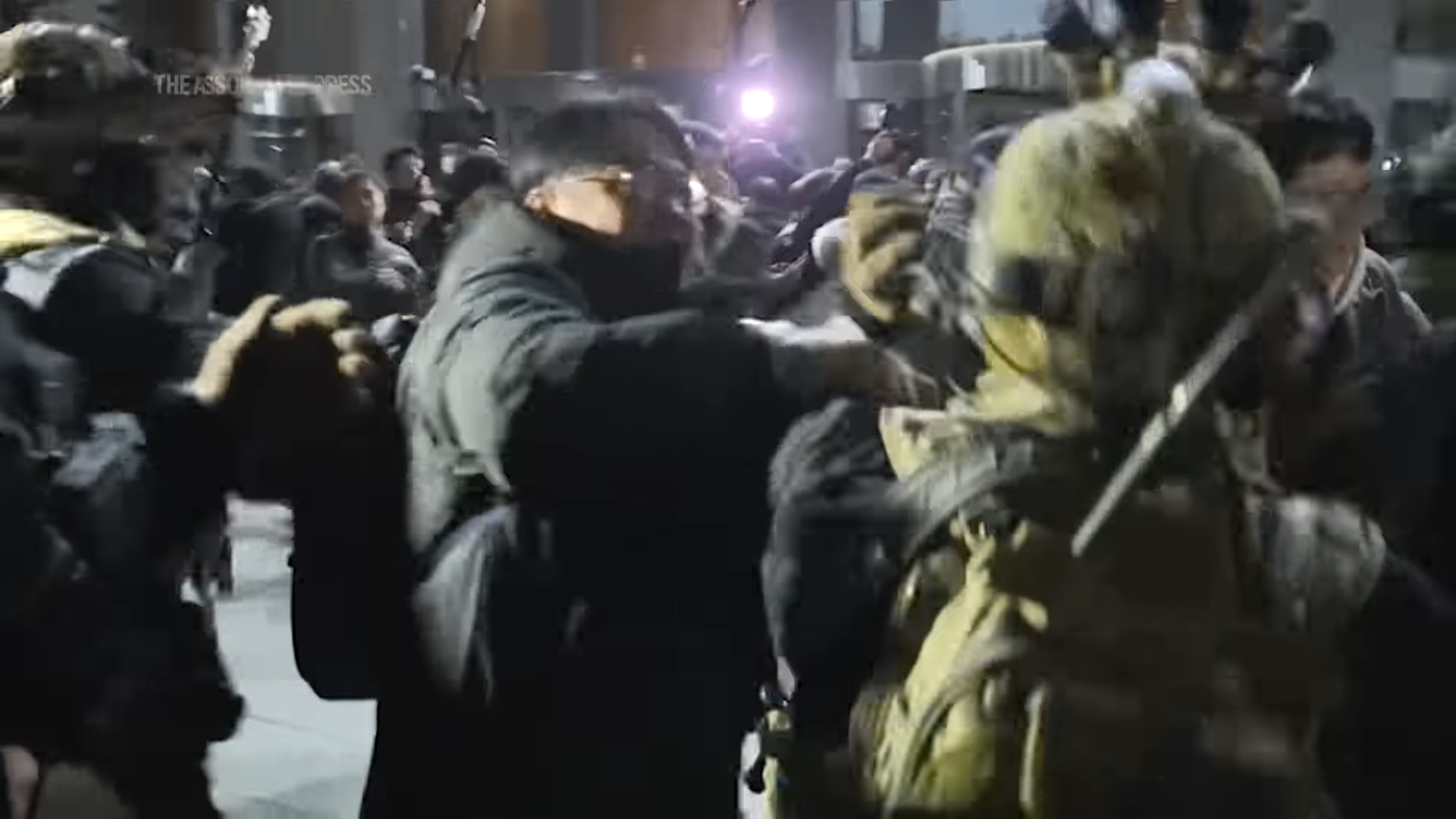South Korean president declares martial law, overruled by parliament

A man grapples with a martial law soldier in front of the South Korean National Assembly. AP/Video (https://www.youtube.com/watch?v=J2ugTLO9-p8)
WASHINGTON, Dec. 5 (ZFJ) — South Korean President Yoon Suk Yeol declared martial law on the night of Tuesday, Dec. 3, only for it to be overruled by the National Assembly several hours later.
In an unannounced press conference at 10:23 p.m. on Tuesday, Yoon accused the opposition Democratic Party of “an obvious anti-state act that plots insurrection” for attempting to impeach multiple government officials and cutting public safety budgets.
“Our National Assembly has become a den of criminals and is attempting to paralyze the nation’s judicial administration system through legislative dictatorship and overthrow the liberal democracy system,” said Yoon.
Dear citizens, I declare emergency martial law to defend the free Republic of Korea from the threats of North Korean communist forces and to eradicate the shameless pro-North Korean anti-state forces that are plundering the freedom and happiness of our people and to protect the free constitutional order.
— South Korean President Yoon Suk Yeol
“Through this emergency martial law, I will rebuild and defend the free Republic of Korea, which is falling into ruin. To this end, I will surely eradicate the criminals of the anti-state forces who have been committing atrocities so far.”
Martial law is a power of the president that hands control of the government over from civilians to the military and is a status meant for times of emergency, such as war. Yoon’s declaration entailed the prohibition of all political activities, including protests and parliamentary proceedings, as well as censorship of the media.
The government also ordered doctors who have been striking since February of this year to return to their jobs.
Following the TV broadcast, civilians rushed to protest in front of the National Assembly building en masse. They were met by soldiers and riot police attempting to block people from entering the building, and fights broke out.
Video from The Associated Press shows civilians grappling with soldiers outside the National Assembly building. Video from The Associated Press shows people obstructing a military vehicle near the National Assembly building.A report by The Associated Press notes that the military announced restrictions on political activities at 11:28 p.m. but took “no immediate steps to enforce” the prohibition.
South Korean law grants the National Assembly, the nation’s parliament, the power to end the president’s martial law decree. Additionally, no National Assembly member may be arrested under martial law unless caught red-handed committing a crime.
As such, Woo Won-shik, speaker of the National Assembly, called on lawmakers to report for a meeting, as 150 of the parliament’s 300 members must be present to achieve quorum and thus conduct business. He later posted on Facebook that the door to the building had been blocked by the police, so he had to climb over a fence to gain access and initiate parliamentary proceedings.
Opposition leader Lee Jae-myung began a livestream in his car while he drove to the parliament building. He encouraged citizens to also go to help lawmakers get inside and expressed concerns that the military might try to arrest parliament members. The stream later shows that he also jumped a fence to gain access.
Woo was able to initiate the 15th plenary session of the 418th National Assembly, and on Wednesday, Dec. 4, at 1:00 a.m., the 190 members who made it unanimously passed a resolution to demand an end to martial law.
“Today, our people and the National Assembly confirmed that the National Assembly is the last source of democracy in Korea,” Woo posted on Facebook. “You believed in the National Assembly and stood by us. Thank you very much to the people.”
Martial law troops began to withdraw after the parliament invalidated Yoon’s declaration.
At 4:20 a.m., Yoon held a second press conference where he announced that he had ordered troops to withdraw in line with the National Assembly’s decision. He still said that the opposition was conducting activities that were “paralyzing the functions of the state.”
Ten minutes later, the State Council, the president’s cabinet, achieved a quorum in an emergency meeting and officially ended martial law.
The opposition party is now calling for Yoon to resign. The National Assembly is expected to vote on the impeachment within the 72 hours after the motion was introduced, according to the constitution’s requirements.
Per South Korea’s constitution, the impeachment requires two thirds or more of the parliament’s votes. Yoon would be removed from office, and the matter would go before the Constitutional Court for adjudication.
Han Dong-hoon, leader of the People Power Party, the ruling party, backed Yoon’s accusations against the Democratic Party, which he said had performed “violent” actions, and declared that he would oppose the impeachment.
“I was more worried yesterday and until this morning than on the day martial law was declared. As the party leader, I will do my best to prevent this impeachment from passing in order to prevent damage to the people and supporters due to unprepared confusion,” Han said. “However, I am absolutely not trying to defend the president’s unconstitutional martial law. From the very beginning of martial law, I have been the first to share the people’s anger and patriotism about this situation, and I will continue to share it in the future.”
Defense Minister Kim Yong Hyun resigned after the National Assembly also moved to impeach him.
South Korea has a long history of military dictatorships and use of martial law to suppress dissent. Martial law had not been declared since the country democratized in 1987 until Tuesday night.
In 1979, after President Park Chung-hee was assassinated, General Chun Doo-hwan performed a coup. Chun then declared martial law in May 1980, banning political activities and closing universities, prompting student protests in the city of Gwangju. The government claimed that communist pro-North Korean sympathizers were rioting. Soldiers deployed to the city killed about 200 students in what is presently known as the Gwangju Uprising.
References
- The Associated Press - @AssociatedPress (YouTube) - South Korean president declares martial law, accusing opposition of anti-state activity - https://www.youtube.com/watch?v=4K9bGfIIyEg
- The New York Times - President Yoon’s Speech Declaring Martial Law - https://www.nytimes.com/2024/12/03/world/asia/president-yoon-speech-martial-law.html (ARCHIVE)
- Korean Broadcasting System - [영상] 윤 대통령, 비상 계엄 선포 ([Video] President Yoon declares martial law) - https://news.kbs.co.kr/news/pc/view/view.do?ncd=8121947
- Korea Legislation Research Institute - Martial Law Act - https://elaw.klri.re.kr/eng_service/lawView.do?hseq=45785&lang=ENG (ARCHIVE)
- Korea Legislation Research Institute - Constitution of the Republic of Korea - https://elaw.klri.re.kr/eng_service/lawView.do?hseq=1&lang=ENG (ARCHIVE)
- 우원식 (National Assembly Speaker Woo Won-shik) - @wonshikw (Facebook) - https://www.facebook.com/wonshikw/posts/pfbid0jykpLS5oroiQM38ULd9PGuwswjV8MrDUTcXTomdedN9qbMqMrmHin3zFCDPMr42gl <우원식 국회의장 긴급 기자회견>
- 우원식 (National Assembly Speaker Woo Won-shik) - @wonshikw (Facebook) - https://www.facebook.com/wonshikw/posts/pfbid02A8bRa44x4GF71PneTAXjzZXemqj7ncHw2dmHbqk2okLGai3wQmYL8bWuZwfCKjYfl 국회의 의결에 따라 대통령은 즉시 비상계엄을 해제해야 합니다.
- 우원식 (National Assembly Speaker Woo Won-shik) - @wonshikw (Facebook) - https://www.facebook.com/wonshikw/posts/pfbid05W3hHgSCneHxtJT39PnYErsXFY6d25fbMiWKxEHj5f4ffbmb4ixm3WBZt9ocCXosl 계엄해제를 요구한 국회의 의결에 따라 대통령은 즉시 비상계엄을 해제해야 합니다.
- 우원식 (National Assembly Speaker Woo Won-shik) - @wonshikw (Facebook) - https://www.facebook.com/wonshikw/posts/pfbid02MyCRpzSvseAjPVZS8qDHGPnunmVgrnHsqaHeixw3sUSaAXEU3eK3dtEoWpzFnKCAl < 국회의장 긴급담화 >
- 우원식 (National Assembly Speaker Woo Won-shik) - @wonshikw (Facebook) - https://www.facebook.com/wonshikw/posts/pfbid0qKhEjc2Ca3JFMWiN5EVxKe9WVdq7KQgvyTpJQ9gLyfFjtXEcXw7rwCUawK82gmYdl 5선의 국회의원을 하며 처음으로 국회담장을 넘은 시각은 어제밤 10시 58분이었습니다.
- 이재명 (Opposition leader Lee Jae-myung) - @이재명tv (YouTube) - 이재명 라이브 스트리밍 중 (Lee Jae-myung is live streaming) - https://www.youtube.com/watch?v=OsoX2NDwsow
- National Assembly of South Korea - 본회의, 「비상계엄 해제 요구 결의안」 의결 (Plenary session passes resolution demanding lifting of martial law) - https://www.naon.go.kr/naon/articleList/contents.do?menuNo=2400011&storyId=eb7b297b-ffa3-4fc5-84f7-8a4a979226c4 (ARCHIVE)
- National Assembly of South Korea - 禹의장, 계엄군 진입 피해상황 점검…“엄중히 책임 묻겠다” (Chairman Woo inspects the damage caused by martial law troops entering) - https://www.naon.go.kr/naon/articleList/contents.do?menuNo=2400016&storyId=12f30919-a218-4989-9a75-731f9df0f717 (ARCHIVE)
- National Assembly of South Korea - 본회의, 「대통령(윤석열) 탄핵소추안」 보고 (Plenary session, report on “Impeachment of the President (Yoon Seok-yeol)”) - https://www.naon.go.kr/naon/articleList/contents.do?menuNo=2400006&storyId=a4f745cc-bb09-44ce-9e2c-80bacfe796de&pageIndex=1&pageListId=naonNow (ARCHIVE)
- Democratic Party of Korea - 이재명 당대표, 계엄선포 및 계엄선포 해제 요구 결의안 가결 관련 입장문 (Lee Jae-myung, Party Leader, Statement on the Declaration of Martial Law and the Resolution Requesting the Lifting of Martial Law) - https://theminjoo.kr/main/sub/news/view.php?sno=0&brd=230&post=1208209&search= (ARCHIVE)
- Democratic Party of Korea - 윤석열 대통령 사퇴촉구 탄핵추진 비상시국대회 모두발언 (All remarks at the emergency meeting to urge President Yoon Seok-yeol to resign and push for impeachment) - https://theminjoo.kr/main/sub/news/view.php?sno=0&brd=230&post=1208218&search= (ARCHIVE)
- Democratic Party of Korea - 제45차 비상최고위원회의 모두발언 (All remarks from the 45th Emergency Supreme Council) - https://theminjoo.kr/main/sub/news/view.php?sno=0&brd=230&post=1208227&search= (ARCHIVE)
- Democratic Party of Korea - 더불어민주당 국회의원 결의문, 윤석열은 퇴진하라 (Democratic Party of Korea National Assembly Members’ Resolution: Yoon Seok-yeol Must Resign) - https://theminjoo.kr/main/sub/news/view.php?sno=0&brd=188&post=1208213&search= (ARCHIVE)
- The Associated Press - @AssociatedPress (YouTube) - South Korea’s president lifts martial law after lawmakers vote against it - https://www.youtube.com/watch?v=FV6UiZTBx78
- People Power Party - 최고위원회의 주요내용 [보도자료] (Highlights of the Supreme Council [Press Release]) - https://www.peoplepowerparty.kr/news/comment_view/BBSDD0001/104553 (ARCHIVE)
(ARCHIVE)
